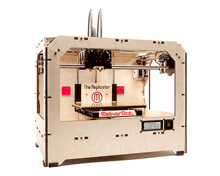 Picture this: You’re taking a biology course and your syllabus says you need a model human skull. But rather than going to the bookstore, or ordering one from Amazon, your professor prints out the models while you’re in class and hands them to you on your way out the door. This might seem a bit far fetched, but maybe not for much longer.
Picture this: You’re taking a biology course and your syllabus says you need a model human skull. But rather than going to the bookstore, or ordering one from Amazon, your professor prints out the models while you’re in class and hands them to you on your way out the door. This might seem a bit far fetched, but maybe not for much longer.
In fact, 3-D printing has been used by manufacturers as a tool for creating prototypes quickly and inexpensively for almost two decades. More recently, developments in the technology have led to a boom in printers designed for large-scale manufacturing (including airplane components, and artificial limbs and joints) as well in-home use.
While it sounds like magic, the process of creating an object with a 3-D printer is actually pretty straightforward and transparent. First, you need to design a three-dimensional object using software that can render models of them. These range from expensive commercial software, such as Autodesk, to Google’s free software, called SketchUp. If you don’t have the time or inclination to learn new software and design your own objects, you can download objects designed by others (including that model skull for your biology class) on websites like Thingiverse.
Next, you’ll need to get a 3-D printer. They are expensive, but some cost less than a new high-end computer. Try MakerBot ($1,749 for the basic home model) or Bits from Bytes ($3,500) for models that will fit in your living room. If you’re feeling a bit more adventurous, you can buy a cheaper kit from either of these companies and do the assembly yourself.
Once the printer is set up and ready to go, you can send your design to the printer and sit back while it prints out your object. The printing process consists of building up tiny layers (about 0.3 mm thick) of material (usually plastic) in three dimensions to form the object. If you want to see a printer in action, check out this video from MIT, where 3-D printing, not surprisingly, was invented.
If you don’t have the money for your own 3-D printer, you can even design something online and have it printed and sent to you, or purchase an item designed by someone else at Shapeways, the first commercial website for designing and custom printing three-dimensional objects.
While we’re probably a couple of decades away from having these printers in our homes, they’ll probably be on campus much sooner than that. Perhaps one day, you’ll even be able to send a design to Campus Print and then print out an object while you’re doing research at the library. When the time comes, we’ll be sure to let you know how it affects your printing quota.
